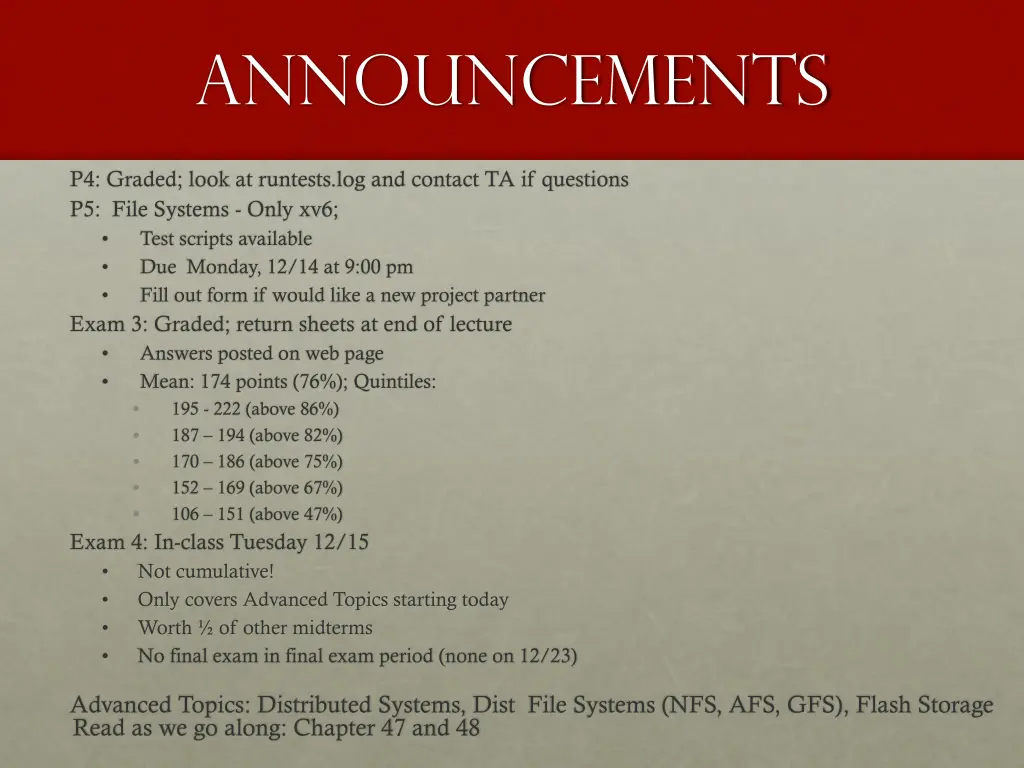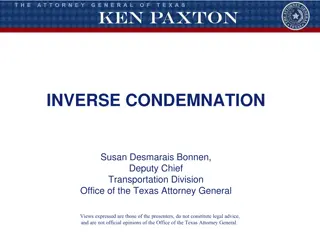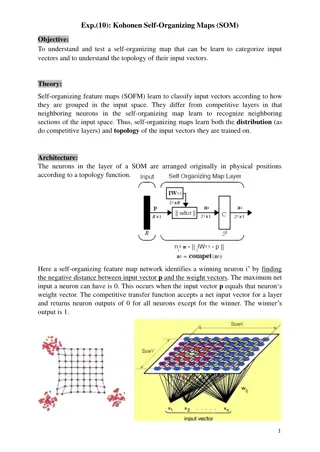
Understanding Distributed Systems in Computer Science
Learn about distributed systems, including key concepts, challenges, and benefits. Explore topics such as reliability, fault tolerance, and communication in distributed computing. Discover why distributed systems are essential for modern computing and how they enable more powerful, scalable, and fault-tolerant applications.
Download Presentation

Please find below an Image/Link to download the presentation.
The content on the website is provided AS IS for your information and personal use only. It may not be sold, licensed, or shared on other websites without obtaining consent from the author. If you encounter any issues during the download, it is possible that the publisher has removed the file from their server.
You are allowed to download the files provided on this website for personal or commercial use, subject to the condition that they are used lawfully. All files are the property of their respective owners.
The content on the website is provided AS IS for your information and personal use only. It may not be sold, licensed, or shared on other websites without obtaining consent from the author.
E N D
Presentation Transcript
Announcements P4: Graded; look at runtests.log and contact TA if questions P5: File Systems - Only xv6; Test scripts available Due Monday, 12/14 at 9:00 pm Fill out form if would like a new project partner Exam 3: Graded; return sheets at end of lecture Answers posted on web page Mean: 174 points (76%); Quintiles: 195 - 222 (above 86%) 187 194 (above 82%) 170 186 (above 75%) 152 169 (above 67%) 106 151 (above 47%) Exam 4: In-class Tuesday 12/15 Not cumulative! Only covers Advanced Topics starting today Worth of other midterms No final exam in final exam period (none on 12/23) Advanced Topics: Distributed Systems, Dist File Systems (NFS, AFS, GFS), Flash Storage Read as we go along: Chapter 47 and 48
UNIVERSITY of WISCONSIN-MADISON Computer Sciences Department CS 537 Introduction to Operating Systems Andrea C. Arpaci-Dusseau Remzi H. Arpaci-Dusseau Advanced Topics: Distributed Systems and NFS Questions answered in this lecture: What is challenging about distributed systems? How can a reliable messaging protocol be built on unreliable layers? What is RPC? What is the NFS stateless protocol? What are idempotent operations and why are they useful? What state is tracked on NFS clients?
What is a Distributed System? A distributed system is one where a machine I ve never heard of can cause my program to fail. Leslie Lamport Definition: More than 1 machine working together to solve a problem Examples: client/server: web server and web client cluster: page rank computation Other courses: CS 640: Networking CS 739: Distributed Systems
Why Go Distributed? More computing power More storage capacity Fault tolerance Data sharing
New Challenges System failure: need to worry about partial failure Communication failure: links unreliable - bit errors - packet loss - node/link failure Motivation example: Why are network sockets less reliable than pipes?
Pipe Writer Process Reader Process user kernel
Pipe Writer Process Reader Process user kernel
Pipe Writer Process Reader Process user kernel
Pipe Writer Process Reader Process user kernel
Pipe Writer Process Reader Process user kernel
Pipe Writer Process Reader Process user kernel
Pipe Writer Process Reader Process user kernel
Pipe Writer Process Reader Process user kernel write waits for space
Pipe Writer Process Reader Process user kernel write waits for space
Pipe Writer Process Reader Process user kernel
Network Socket Machine A Machine B Writer Process Reader Process user user Router kernel kernel
Network Socket Machine A what if router s buffer is full? Machine B Writer Process Reader Process user user Router kernel kernel
Network Socket Machine A what if B s buffer is full? Machine B Writer Process Reader Process user user Router kernel kernel
Network Socket Machine A Writer Process user From A s view, network and B are largely a black box. ? kernel
Communication Overview Raw messages: UDP Reliable messages: TCP Remote procedure call: RPC
Raw Messages: UDP UDP : User Datagram Protocol API: - reads and writes over socket file descriptors - messages sent from/to ports to target a process on machine Provide minimal reliability features: - messages may be lost - messages may be reordered - messages may be duplicated - only protection: checksums to ensure data not corrupted
Raw Messages: UDP Advantages Lightweight Some applications make better reliability decisions themselves (e.g., video conferencing programs) Disadvantages More difficult to write applications correctly
Reliable Messages: Layering strategy TCP: Transmission Control Protocol Using software, build reliable, logical connections over unreliable connections Techniques: - acknowledgment (ACK)
Technique #1: ACK Sender [send message] Receiver [recv message] [send ack] [recv ack] Sender knows message was received
ACK Sender [send message] Receiver Sender doesn t receiveACK What to do?
Technique #2: Timeout Sender [send message] [start timer] Receiver waiting for ack [timer goes off] [send message] [recv message] [send ack] [recv ack]
Lost ACK: Issue 1 How long to wait? Too long? System feels unresponsive Too short? Messages needlessly re-sent Messages may have been dropped due to overloaded server. Resending makes overload worse!
Lost Ack: Issue 1 How long to wait? One strategy: be adaptive Adjust time based on how long acks usually take For each missing ack, wait longer between retries
Lost Ack: Issue 2 What does a lost ack really mean?
Lost ACK: How can sender tell between these two cases? Sender [send message] Receiver Case 1 [timout] Sender [send message] Receiver Case 2 [recv message] [send ack] [timout] ACK: message received exactly once No ACK: message may or may not have been received What if message is command to increment counter?
Proposed Solution Sender [send message] Receiver Case 2 [recv message] [send ack] [timout] Proposal: Sender could send an AckAck so receiver knows whether to retry sending an Ack Sound good?
Aside: Two Generals Problem general 1 general 2 enemy Suppose generals agree after N messages Did the arrival of the N th message change decision? - if yes: then what if the N th message had been lost? - if no: then why bother sending N messages?
Reliable Messages: Layering Strategy Using software, build reliable, logical connections over unreliable connections Techniques: - acknowledgment - timeout - remember sent messages
Technique #3: Receiver Remembers Messages Sender [send message] Receiver [recv message] [send ack] [timout] [send message] [ignore message] [send ack] [recv ack] how does receiver know to ignore?
Solutions Solution 1: remember every message ever received Solution 2: sequence numbers - senders gives each message an increasing unique seq number - receiver knows it has seen all messages before N - receiver remembers messages received after N Suppose message K is received. Suppress message if: - K < N - Msg K is already buffered
TCP TCP: Transmission Control Protocol Most popular protocol based on seq nums Buffers messages so arrive in order Timeouts are adaptive
Communications Overview Raw messages: UDP Reliable messages: TCP Remote procedure call: RPC
RPC Remote Procedure Call What could be easier than calling a function? Strategy: create wrappers so calling a function on another machine feels just like calling a local function Very common abstraction
RPC Machine A Machine B int main( ) { int x = foo( hello ); } int foo(char *msg) { } int foo(char *msg) { send msg to B recv msg from B } void foo_listener() { while(1) { recv, call foo } } What it feels like for programmer
RPC Machine A Machine B int main( ) { int x = foo( hello ); } int foo(char *msg) { } int foo(char *msg) { send msg to B recv msg from B } void foo_listener() { while(1) { recv, call foo } } Actual calls
RPC Machine A Machine B int main( ) { int x = foo( hello ); } int foo(char *msg) { } int foo(char *msg) { send msg to B recv msg from B } void foo_listener() { while(1) { recv, call foo } } client wrapper server wrapper Wrappers
RPC Tools RPC packages help with two components (1) Runtime library Thread pool Socket listeners call functions on server (2) Stub generation Create wrappers automatically Many tools available (rpcgen, thrift, protobufs)
Wrapper Generation Wrappers must do conversions: - client arguments to message - message to server arguments - convert server return value to message - convert message to client return value Need uniform endianness (wrappers do this) Conversion is called marshaling/unmarshaling, or serializing/deserializing
Wrapper Generation: Pointers Why are pointers problematic? Address passed from client not valid on server Solutions? - smart RPC package: follow pointers and copy data
RPC over TCP? Sender [call] [tcp send] Receiver Why wasteful? [recv] [ack] [exec call] [return] [tcp send] [recv] [ack]
RPC over UDP Strategy: use function return as implicit ACK Sender [call] [tcp send] Receiver [recv] [ack] [exec call] Piggybacking technique [return] [tcp send] What if function takes a long time? [recv] [ack] - then send a separate ACK
Distributed File Systems File systems are great use case for distributed systems Local FS: processes on same machine access shared files Network FS: processes on different machines access shared files in same way
Goals for distributed file systems Fast + simple crash recovery - both clients and file server may crash Transparent access - can t tell accesses are over the network - normal UNIX semantics Reasonable performance
NFS Think of NFS as more of a protocol than a particular file system Many companies have implemented NFS: Oracle/Sun, NetApp, EMC, IBM We re looking at NFSv2 NFSv4 has many changes Why look at an older protocol? Simpler, focused goals To compare and contrast NFS with AFS (next lecture)
Overview Architecture Network API Write Buffering Cache








